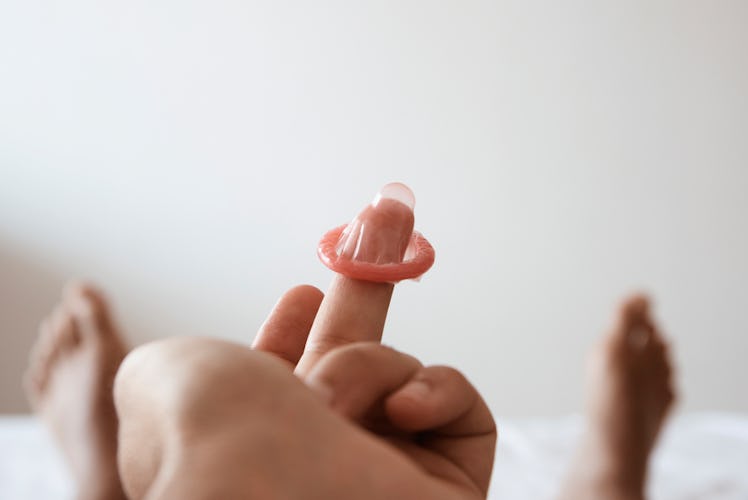
Condoms Don't Fully Protect You From Herpes, So Here's What You Need To Know
In true millennial fashion, I'm not exactly a fan of anything permanent. So essentially, my two major concerns in life are, "I'm locked into this phone plan for how long?!" and, "Do condoms protect against herpes?" I hate to admit it but my sex ed. lecture in high school looked a lot like the bizarre one Coach Carr gives in Mean Girls, except this was Catholic school, so we absolutely did not get condoms afterward. Beyond my pop culture knowledge that you should always ~wrap it up~, I didn't really give much thought to other ways I could protect myself against STDs.
Luckily, I've learned a lot since high school. For example, I know now that more than half of all Americans have oral herpes and one in six have genital herpes, according to Planned Parenthood. Plus, condoms aren't 100 percent effective against preventing the transmission of STDs, which brings me to my most important revelation of all: There's so much more to worry about than cum (and yeah, pre-cum, too). Some STDs, including herpes, can be transmitted via intimate skin-to-skin contact.
According to Planned Parenthood, herpes is so common because it's a "sneaky infection," meaning you can't always tell if you or someone else is infected just based on outward appearances. Although the infection is most often associated with sores and blisters near the mouth and genital regions, you can go years with the virus in your body and not have any symptoms.
That said, here's what you need to know to protect yourself against herpes, according to Dr. Prause, sexual physiologist and founding neuroscientist at sexual biotechnology company Liberos, and Dr. Cindy Duke, OB-GYN and medical director of the Nevada Fertility Institute.
How is herpes transmitted?
Herpes is spread through skin-to-skin contact with infected areas, which is why it's so common. That means that in addition to being at risk during vaginal sex, you can also contract it from kissing, oral sex, and anal sex.
Dr. Duke explains that because of an increase in genito-oral sex, both type I or HSV-1 (typically associated with oral herpes) and type II or HSV-2 (typically associated with genital herpes) of the herpes virus are being spread interchangeably.
In fact, Dr. Prause adds, "Herpes is so common from oral sex now that the herpes test alone no longer differentiates whether you have genital or oral herpes. You would need an actual sore sampled from the genitals or mouth to know for sure where you have herpes if a blood test comes back positive."
For this reason, either virus when on or around the vulva, vagina, cervix, anus, penis, scrotum, butt, or inner thighs is referred to as genital herpes. Similarly, either virus that affects the lips, mouth, or throat is referred to as oral herpes.
Although you don't have to have sex to contract herpes, Planned Parenthood reports that you cannot get infected from hugging, holding hands, coughing, sneezing, or sitting on toilet seats because the virus dies outside of the body fairly quickly.
Do condoms protect against herpes?
As you might have guessed by now, no, not really. Dr. Prause tells Elite Daily, "Condoms definitely protect against herpes in the sense that they drastically lower the risk of transmission. However, condoms are less effective for herpes than for other infections, because herpes is spread by skin-to-skin contact. Genital rubbing prior to penetration, which is often without a condom, and mouth-genital contact can spread herpes, too."
The same goes for dental dams. While these may help to lower the risk of infection, you and your partner will likely still come into contact with areas that aren't fully covered.
If not condoms, what is the best defense against herpes?
First, get tested for herpes — especially if you think you may have been infected. You can contact your local Planned Parenthood health center, your campus clinic, or your private physician to schedule an appointment for STD testing and treatment.
Although the herpes virus remains in the body forever, you can still continue to have sex safely and responsibly if you or your partner is infected. Herpes isn't a death sentence of something you should be ashamed of.
Dr. Duke says, "If you are infected, take suppressions or prescription medications, like Valtrex and Acyclovir, as recommended by your doctor. Avoid sexual contact while you are having an outbreak and up to one week after your outbreak lesions have healed to protect your partner or partners from getting infected."
If you are not infected but are worried your partner might be, look out for active lesions or sores on your partner's body (around the mouth and genitals). Herpes can remain dormant in the body for years but the risk of infection is highest during outbreak, so that's when you'd want to avoid hooking up in order to prevent transmission.
This article was originally published on